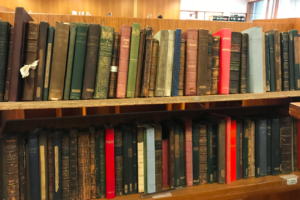 We have been lucky enough to gain permission from Glasgow’s Mitchell Library to survey all the books in their ‘Poets’ Corner’ collection of Scottish poetry, volume by volume and shelf by shelf. As a contribution to our partnership with the Mitchell, we are recording basic information on each book for them, and along the way finding treasures for the ‘Piston, Pen & Press’ database. In less than a full week’s work, I have recorded over 800 single-author books or pamphlets, and over 250 anthologies, translations, or other works. The earliest work in the list is from 1701. The latest, so far, is from 1961.
We have been lucky enough to gain permission from Glasgow’s Mitchell Library to survey all the books in their ‘Poets’ Corner’ collection of Scottish poetry, volume by volume and shelf by shelf. As a contribution to our partnership with the Mitchell, we are recording basic information on each book for them, and along the way finding treasures for the ‘Piston, Pen & Press’ database. In less than a full week’s work, I have recorded over 800 single-author books or pamphlets, and over 250 anthologies, translations, or other works. The earliest work in the list is from 1701. The latest, so far, is from 1961.
We plan to share these spreadsheets not only with the library, but with scholars of eighteenth, early nineteenth and mid-twentieth century Scottish poetry, who may find treasures of their own. For us, to gain this kind of access to a little-known and relatively uncatalogued collection of nineteenth-century Scottish poets is invaluable. As all scholars of working-class poetry know, it is difficult to gauge who an author is, and what they wrote about, from their name and the title of their book. Indeed, these can sometimes seem wilfully misleading. It is unlikely that I would ever have ordered Robert Tait’s Rustic Songs of Nature (1919) from the Mitchell’s catalogue. But Tait was the son of a Lanarkshire miner and started work in the mines himself aged 11. He began writing poetry, while still working as a collier, because he was inspired by joining the Wingate Burns Club (named after David Wingate, the well-known miner-poet?). He is exactly the kind of writer we hope to find. As is Lewis Proudlock (The Borderland Muse (1896)), also a miner, in Northumberland. Or John Parker, whose Miscellaneous Poems reveal him to be a very social carpet-weaver in the Port Eglinton Works; or James Ogg, whose two collections were written from the bleachfields and an Aberdeen sawmill; or Matthew Anderson, who started work in the mines before becoming a policeman for the mining communities in East Ayrshire.
This is an archive full of stories. John Anderson was one of six employees of the printing office of Hay, Nisbet and Co to die in the First World War. The office published his book posthumously. The pseudonymous ‘Iram’ [John Adams], author of All Sorts, published from the Royal Edinburgh Lunatic Asylum. One of the two copies of his book in this collection contains a note by him ‘Presented to Miss Jessie Methuen by the humble author a patient in the Edinburgh Lunatic Asylum. May the Lord restore unto him his reason.’ Walter Chisholm, a ‘Berwickshire shepherd lad’, died aged 21, but not before he won the most coveted honour for Scottish working-class poets, a prize in the People’s Journal Christmas competition of 1876. Hugh Craig of Ayrshire is the only poet I have yet found who was brazen enough to reprint his own advertising verse in a collection: every poem and prose piece in Ayrshire Aspirations (1876) ends, joyfully, by suggesting that what the reader really needs is a visit to Craig’s clothing store.
We look forward to following up on these findings. Some of these writers may find themselves added to the ‘Labouring-Class Poets Database’. Some may be included in our publications. Many will feature in our database, and might find their works adopted by our musicians. And others will hopefully find their own excited readers. With – by the latest estimate – well over 100 shelves still to go, we will keep you posted on progress.

